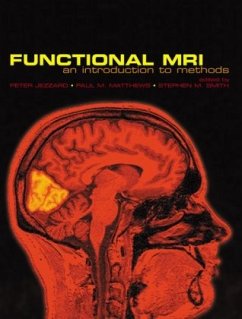This book provides a comprehensive introduction to functional magnetic resonance imaging (fMRI), the scanning
technique which allows the mapping of active processes within the brain.
There are six sections to the book with chapters from an expert international team. Part I provides a broad overview of the field and sets the context. Part II describes the physiological and physical background to fMRI, including coverage of the hardware required and pulse sequence selection. Practical issues involving experimental design of the paradigms, psycho-physical stimulus delivery and subject response are covered in Part III, followed by a comprehensive treatment of data analysis in
Part IV. Part V deals with practical applications of the technique in the field of neuroscience and in clinical practice. The final section describes how fMRI can be integrated with other neuro-electromagnetic functional mapping techniques.
Functional Magnetic Resonance Imaging: An Introduction to Methods is written to be accessible to a wide-ranging
audience of research scientists interested in studying how the normal brain works, and clinicians interested in
monitoring disease states and processes.
technique which allows the mapping of active processes within the brain.
There are six sections to the book with chapters from an expert international team. Part I provides a broad overview of the field and sets the context. Part II describes the physiological and physical background to fMRI, including coverage of the hardware required and pulse sequence selection. Practical issues involving experimental design of the paradigms, psycho-physical stimulus delivery and subject response are covered in Part III, followed by a comprehensive treatment of data analysis in
Part IV. Part V deals with practical applications of the technique in the field of neuroscience and in clinical practice. The final section describes how fMRI can be integrated with other neuro-electromagnetic functional mapping techniques.
Functional Magnetic Resonance Imaging: An Introduction to Methods is written to be accessible to a wide-ranging
audience of research scientists interested in studying how the normal brain works, and clinicians interested in
monitoring disease states and processes.

